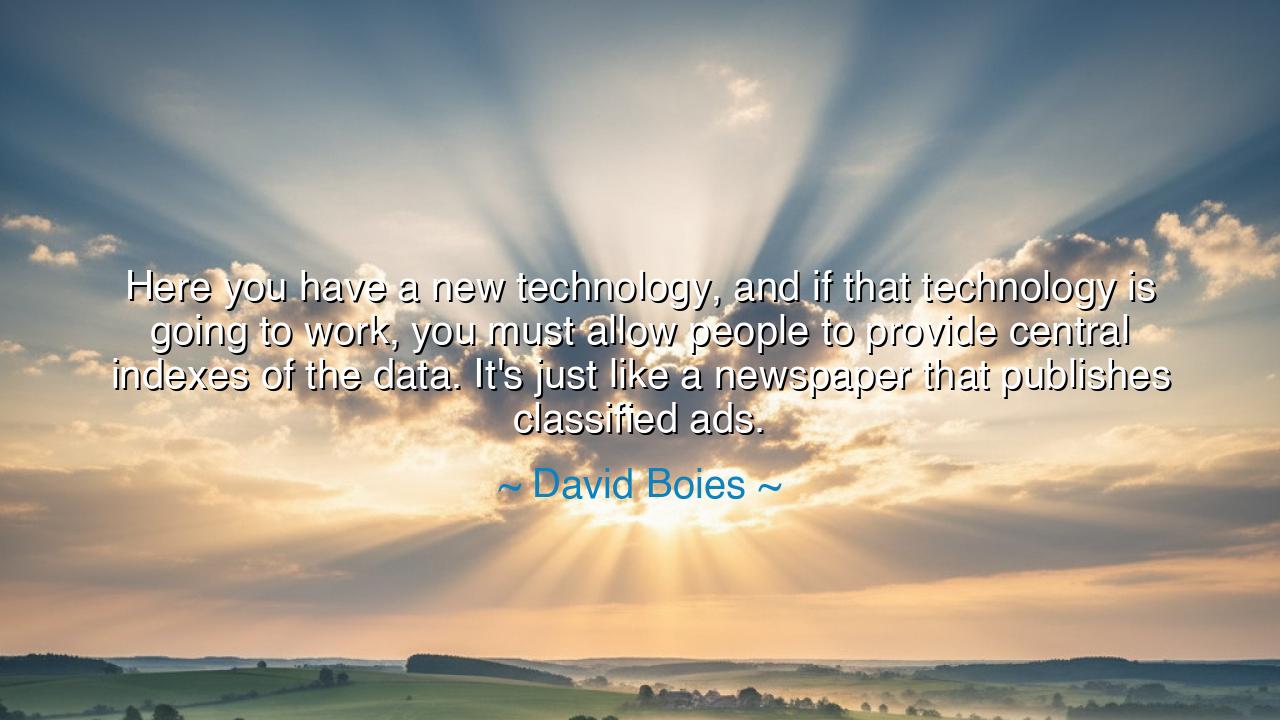
Here you have a new technology, and if that technology is going
Here you have a new technology, and if that technology is going to work, you must allow people to provide central indexes of the data. It's just like a newspaper that publishes classified ads.






In the words of David Boies, a man renowned for his battles in the courts of law, there resounds a truth about the life of progress and the destiny of invention: “Here you have a new technology, and if that technology is going to work, you must allow people to provide central indexes of the data. It’s just like a newspaper that publishes classified ads.” Though the statement arose from debates over digital rights and the age of the internet, its meaning stretches far beyond its time, touching the eternal balance between innovation, access, and the ordering of knowledge.
For what is technology if not a river of possibility? Yet a river without channels floods the land, bringing confusion rather than life. To make it useful, one must guide its waters, giving them form and direction. So too with information: without central indexes, it remains scattered and hidden, a chaos of fragments. But when gathered and organized, it becomes as a library, open to all who seek. Boies reminds us that the power of technology is not in its mere existence, but in the structures that make it accessible to the people.
Consider the analogy he gives: the newspaper and its classified ads. In the days before the internet, those in need—of work, of housing, of goods—did not wander aimlessly from door to door. Instead, they turned to the central index provided by the paper, where all could publish and all could search. The newspaper was not the thing being bought or sold; it was the bridge between seekers and providers, the order in the midst of countless desires. Without it, each transaction would have been a lonely cry in the wilderness. So too, Boies says, must new technologies provide their own bridges, lest their promise dissolve into confusion.
We see this principle echoed in history. Recall the Library of Alexandria, where scrolls from across the known world were gathered into a single place. What made it wondrous was not that books existed—for they already did—but that they were indexed, catalogued, made discoverable. Knowledge, when scattered, is as useless as jewels buried deep underground. Knowledge, when ordered and made accessible, becomes the crown of civilizations. In this ancient library, as in Boies’ vision for digital technologies, the central index was the key that turned potential into power.
Yet Boies’ words also contain a warning. For whenever knowledge is gathered, there arises the question: Who holds the key? The index may enlighten, but it may also control. Just as the newspaper editor chose what ads to print, so too those who hold the indexes of digital life wield great influence. This is a lesson both hopeful and dangerous: central indexes are the blood of technology, but they must be governed with fairness, lest they become shackles instead of bridges.
The meaning of the quote, then, is both simple and profound. Technology cannot thrive in isolation; it requires organization, accessibility, and trust. Without central structures, its promise remains unrealized; with them, it becomes woven into the fabric of society. But the creation of these indexes is not merely a technical task—it is a moral one, demanding that they serve the many rather than exploit them.
The lesson for us is clear: in our own lives and labors, we must not only create but also order, not only innovate but also connect. Do not build in a way that isolates; build in a way that bridges. If you work with knowledge, ensure it can be found. If you build tools, ensure they can be used by more than the few. And if you hold power over information, wield it with justice, as the ancients taught kings to wield their laws.
So, children of the present and the future, heed the teaching of Boies: embrace new technologies, but do not forget the necessity of central indexes, the structures that turn chaos into meaning. In your own craft, seek always to be the bridge, the cataloguer, the guide who transforms scattered pieces into living knowledge. For in this lies the power not only to master technology, but to shape society itself.






AAdministratorAdministrator
Welcome, honored guests. Please leave a comment, we will respond soon